The Endless: Aaron Moorhead and Justin Benson interview
It's a must-see indie sci-fi about a UFO death cult. We talk to its makers and stars, Aaron Moorhead and Justin Benson...
Out this week in the UK, The Endless is a great example of how effectively digital technology can be used in the hands of imaginative filmmakers. Written, directed and starring Justin Benson and Aaron Moorhead, The Endless is a taut, twist-laden piece that defies easy categorisation: it has moments of horror, but also plenty of dark humour; there are fascinating sci-fi concepts, but its story of two brothers returning to the rural cult of their youth is grounded in well-observed, everyday drama.
Most of all, it’s superbly shot on a low budget: Moorhead’s the production’s cinematographer, and his camerawork is agile and imaginative. Its use of aerial shots (achieved by using a drone) provide an eerie, god’s eye view of the world that fits with the movie’s nightmarish themes. A few years ago, shots like these would have been the preserve of a much larger production; in The Endless, and the duo’s previous film, the hugely atmospheric horror romance Spring, they’re integral to the storytelling.
As The Endless arrives on its home release, we caught up with Moorhead and Benson to talk about their cracking new movie, how it ties into their debut, Resolution, defying genre expectations, and lots more.
I wonder if you could tell me which came first: the concept of the UFO cult, or the idea of these two characters, or some of the knottier sci-fi elements?
Justin Benson: What’s funny is, this film actually has a not-so-slight tie in to Resolution – our first film. So a lot of the mythological groundwork for the film was laid in Resolution. And of course, they’re just companion pieces to each other – you don’t have to see one to understand or appreciate the other. But when we were making Resolution, this mythology came about, and as we were putting together this film, which is a much longer story, we just realised that the mythology hadn’t really left us.
We were talking about different ideas in that same space – we had another idea starring those two characters, and so if we were gonna make a story that we knew from the get-go that we wanted to make about rebellion and anti-conformity, and authority within relationships… We knew if we were going to use that as a theme, then we needed to have a sci-fi concept that dovetailed with that perfectly – this Resolution mythology. And of course, within a brotherly relationship, if one dominates the other, then it seems like we’re connecting to the same theme.
It’s interesting you saying the theme’s about rebellion, because the thing about the cult and its lifestyle is, it kind of speaks to a feeling among young people that the system doesn’t really work for them. On one level, the cult in your movie seems quite welcoming and pleasant.
Aaron Moorhead: I think there’s definitely something that’s in the wind right now that makes people perk up when a story has something to do with cults. We aren’t really equipped to comment too well on it, to be honest. Cults are interesting, but they’re still very much a fringe phenomenon. So it’s still something that’s just happening on the edges. But the fascination with cults could just be a sign of the times – either politically or with people are feeling in their own lives.
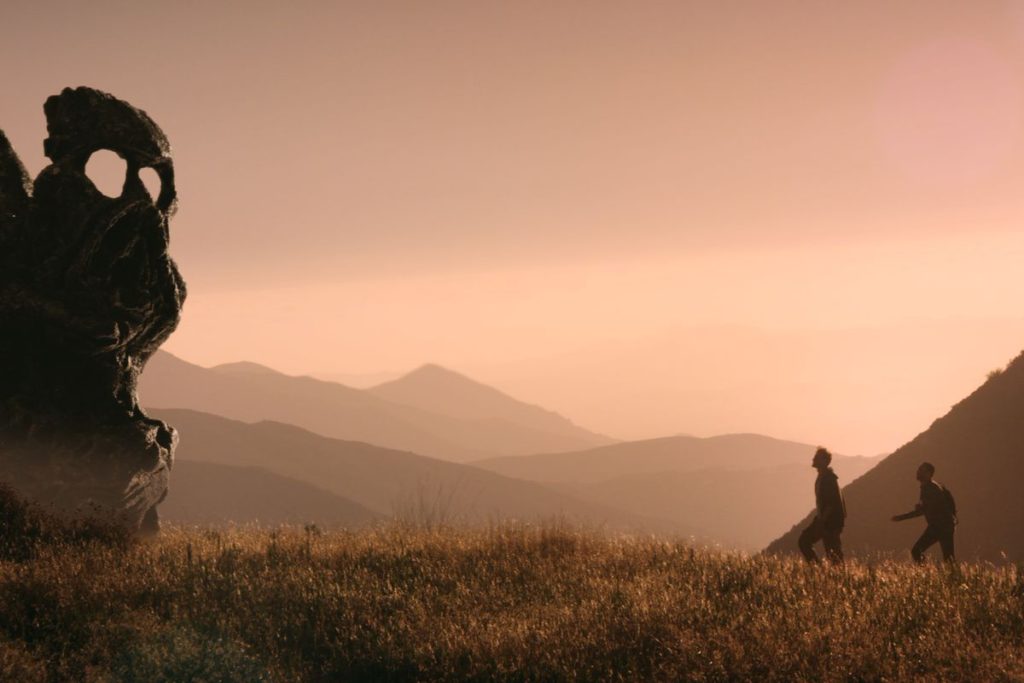
There’s something universal too about the idea of being stuck in our own personal bubbles or cycles. Whether it’s work, or our cliques online, things like that.
AM: Yeah, absolutely. I wish I could comment more on it, but yeah. A lot of the time, I think people do feel like they’re metaphorically repeating themselves, and that’s something that’s not only dangerous, but unhealthy. We’re bringing it to the forefront in a more literal way – trying to avoid spoilers here – but yeah, it’s something that will affect people one way or another if you turn the sci-fi concept of the movie onto your own life. You might find some fertile ground to dig there.
You have a quote from HP Lovecraft at the start of the film, and your last film, Spring, felt quite Lovecraftian. Is he an influence on your filmmaking?
JB: Yeah, we weren’t familiar with HP Lovecraft at all when we made Resolution and Spring, but [the quote] became a really useful way to describe our film. And then after you hear it so many times, with people comparing Spring to Lovecraft, we actually started reading some Lovecraft… we still aren’t directly influenced by it, but we are very much directly influenced by Stephen King and Alan Moore, who have been influenced by Lovecraft.
AM: We wrote our mythology in about 2010, 2011. And at that time, I had no idea who HP Lovecraft was. So there’s a coincidental thing there that’s interesting. But there’s some influence from Lovecraft in The Endless – way more than there was in Resolution and Spring. The Color Out Of Space has that thing about a particular geographical area being kind of haunted, in a way.
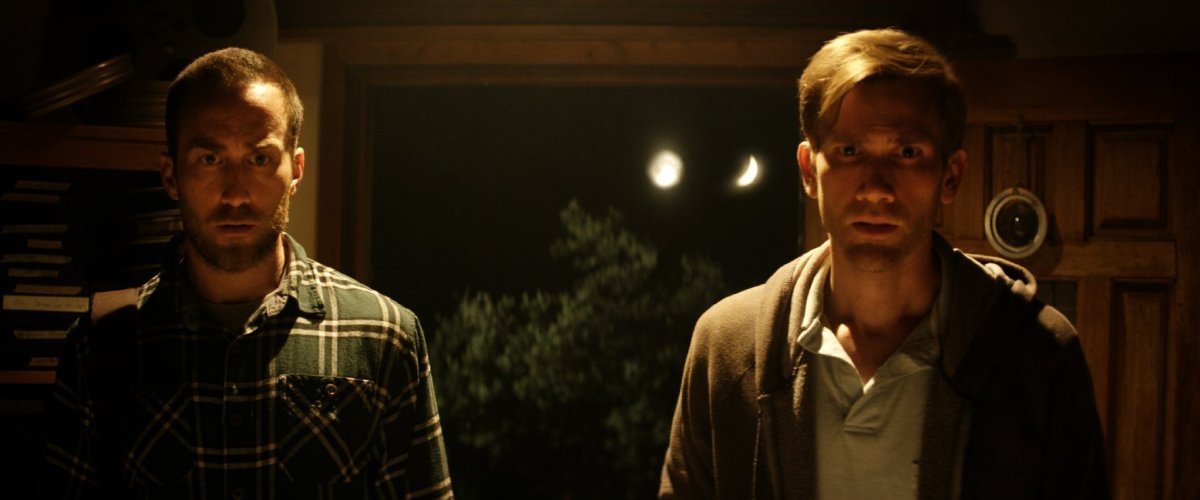
Is it important to you not to be too saddled by genre expectations? The Endless has sci-fi-, bits of horror, it’s very much a drama, and it’s also very funny at times.
JB: Yeah, we make sure that we don’t ever really talk about genre expectations in our films. We actually, if someone had asked us what we’re making, we usually freeze up a little, and then we’ll say, “A horror, sci-fi thriller, something like that”. And we basically decided very early on, even when were making our first movie, to just not worry about the trappings of genre. Because worrying about genre only makes our product worse. If you think of genre as, if you can hit these specific goal posts in order to be part of a genre, then it gets this quality of being called a horror film or a drama film or something. And that’s the most backwards way possible of creating a film that I can imagine.
Because all it is is a way of describing something so that we can have an easy way of talking about it. “Oh, we call this group of movies horror because it has these elements in it.” But some people put the cart before the horse and say, “I’m going to make a horror movie, therefore I need to do certain things.” But what that does is make the movie less frightening in the case of a horror movie, because you’re doing the predictable, and one of the biggest ways of making things tense in a thriller or interesting in a sci-fi movie or scary in a horror movie is to do the unexpected.
Does that extend to your filmmaking and cinematography? I like the way you use the camera in your movies – it’s very free, very mobile and expressive.
AM: Yeah. Yeah, one of the things we put in with our shot listing is that we allow the camera to be a subjective presence in the story – the camera wanders off from the characters and gives you additional information. It started with Resolution – it was a very literal thing, where we had the camera as the point of view of the antagonist. But it’s something we’ve stuck to stylistically.
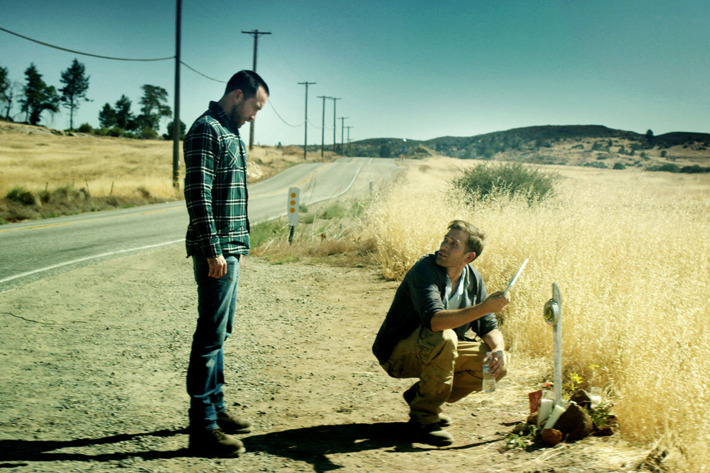
You have these really cool aerial shots as well, which I’m guessing were done with drones.
AM: Yeah, those were drones. It’s funny, we made one of the earliest independent films to use those – that was Spring. But now they’re everywhere – they’re in every single film, but they still don’t fail to fascinate. So a lot of the time, what we do is sit down and think about what tools we have. The tools can be, can we act? Can we tie knots? Can we swim? What locations do we have available? And one of the things we had available was a drone, but what we wanted to make sure of was that, on this huge wave of everybody having a drone, we don’t want to be the guys who are just throwing in the drone shot.
And so we have a very literal sci-fi, mythological reason why the drone shots are in there. And in a way, the movie wouldn’t work without those drone shots. So that’s a nice example of modern technology doing something that we can afford on this tiny little movie, and it dovetailing really nicely with our story.
Yeah. So you coming to act in it was an expediency as well in a way.
AM: It was less about keeping the budget down and more about being as self-reliant as possible. We’ve got a lot of bigger projects that take longer to get going. And one of the things you have on bigger projects is that you get hung up on casting. That’s just one of the things that can happen. In this case, we wanted to make a film that, no matter what, we can do it – nobody can stop us. It needed to be something we could make as fast as we wanted.
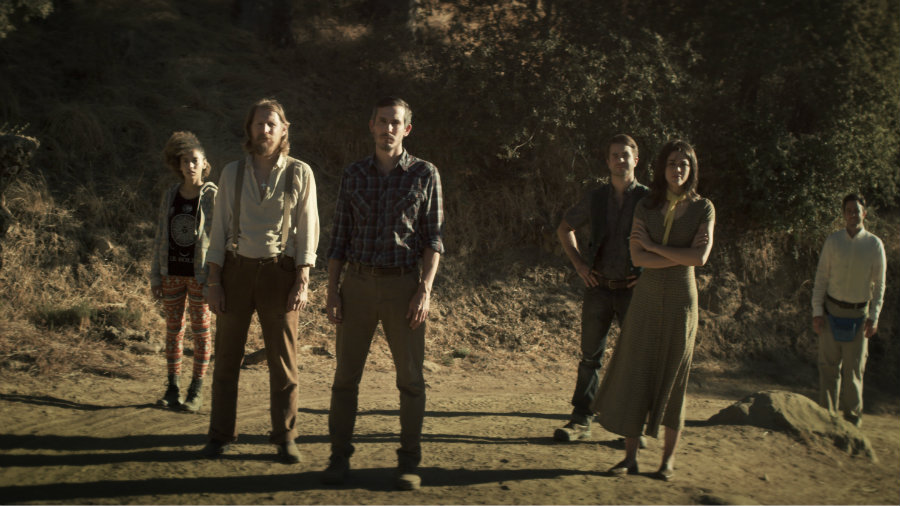
I’m guessing that, if you went to a Hollywood executive with the phrase, “UFO death cult” they wouldn’t be in a rush to finance it, necessarily, for a huge amount of money.
JB: They might be nowadays. There does seem to be a new Netflix documentary about cults released every few months. But this movie is definitely strange enough and left of centre enough that… there’s no world in which this movie would be financed by a studio. But that said, it was enthusiastically financed by our financeers. They were all about, “This is interesting enough to stand out”, which is a completely different mindset.
I wonder if that’s one of the difficulties as filmmakers now: not just getting the film made, but cutting through the mix. Getting your film noticed.
AM: Yeah. I think the thing is, the kind of things that Justin and I are attracted to are not always the kinds of things that are slamdunks for major, major, dollar-signs-in-your-eyes releases. The kinds of movies that are designed to appeal to lots of different people – younger males and females and older males and females – that kind of four-quadrant movie – we might be able to make that kind of a thing.
But we gravitate towards films where the emotions are a little too specific. The good news is that that’s okay – it makes the target a little harder to hit, but it exists. It’s out there, you’ve just got to dig really hard. Also, on top of that, we’ll absolutely be making movies for lots of people, but they won’t be so broad that they have to appeal to literally everyone.
That makes sense. Also, it feels a little sad sometimes that the expected career path is that you make one or two smaller movies and then, if you go and make a $150m film, you’ve somehow made it. That’s not necessarily the only path.
JB: Yeah, yeah. We’ve done three small films now – still no $150m films for us. But you’re right – you could argue there’s two paths. Keep making small movies, or make a small movie and then make Godzilla. But we found that there are a lot of other opportunities, like television. And the more small movies you make, the closer you get to making something on the scale of, say, Arrival. There aren’t very many of those, but they happen. I think, if you stick it out long enough, those stars will eventually align.
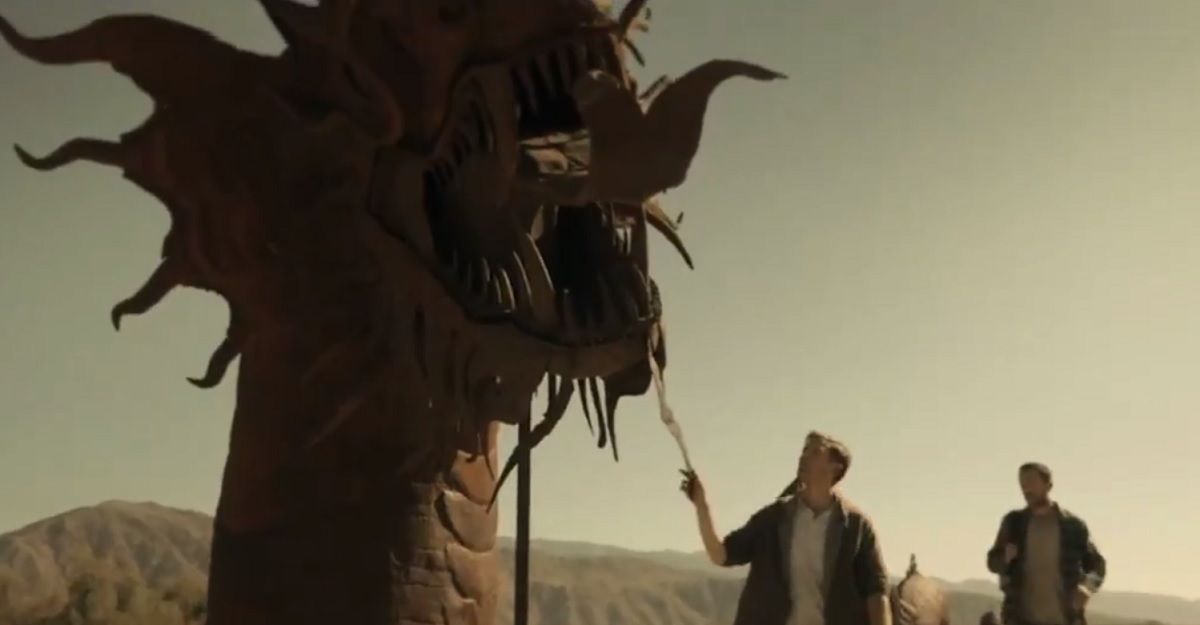
Do you know what you’re making next? Is that something you can talk about yet?
AM: We can only talk in broad strokes about. Because here’s the problem – I’ll outline something kind of interesting. In film, but especially independent film, people say that you have to have this one thing that’s next, so that when you talk about it, everybody knows that’s exactly where all your efforts are going, right? And there’s actually pressure to do that. It’s what you have to do, I understand that. But once you get to a certain point with those projects, it goes out into the world, and then there’s weeks and months and potentially years of waiting for the next step on that.
We’re filmmakers, and there’s two of us, and we’re extremely restless people. So if we spent those months and years just waiting, we’d never get anything done. So in those months and years, we create something else, and then that goes into the world, and then we create something else. So what it is is, we have a few feature films at different budget levels – everything’s slightly bigger than The Endless.
And we have a couple of TV shows that we have set up at networks right now; we don’t know that they’re gonna go, but they’re written, and we love them. So that’s where we’re at. One way or another, we want to be back on set by the end of the year.
That’s good news! Aaron Moorhead and Justin Benson, thank you very much.
The Endless is released by Arrow Films in Cinemas, and via Arrow Video on Digital HD on 29th June.